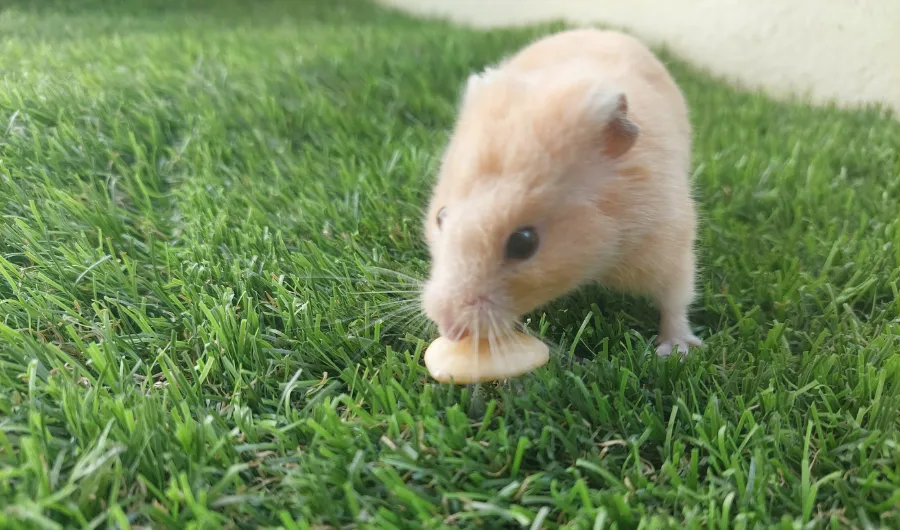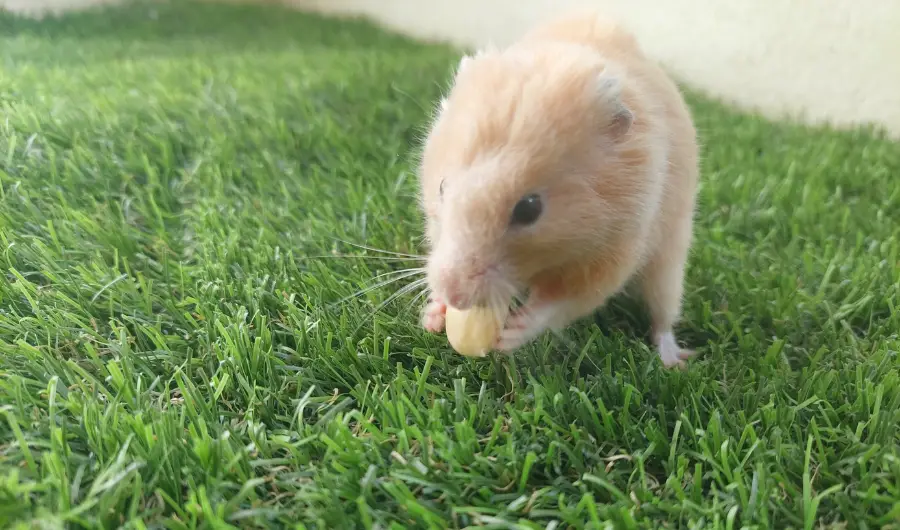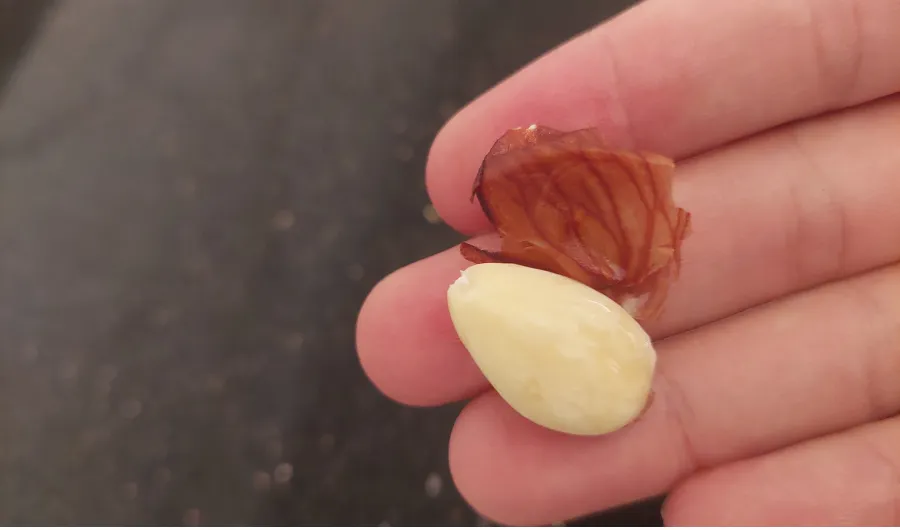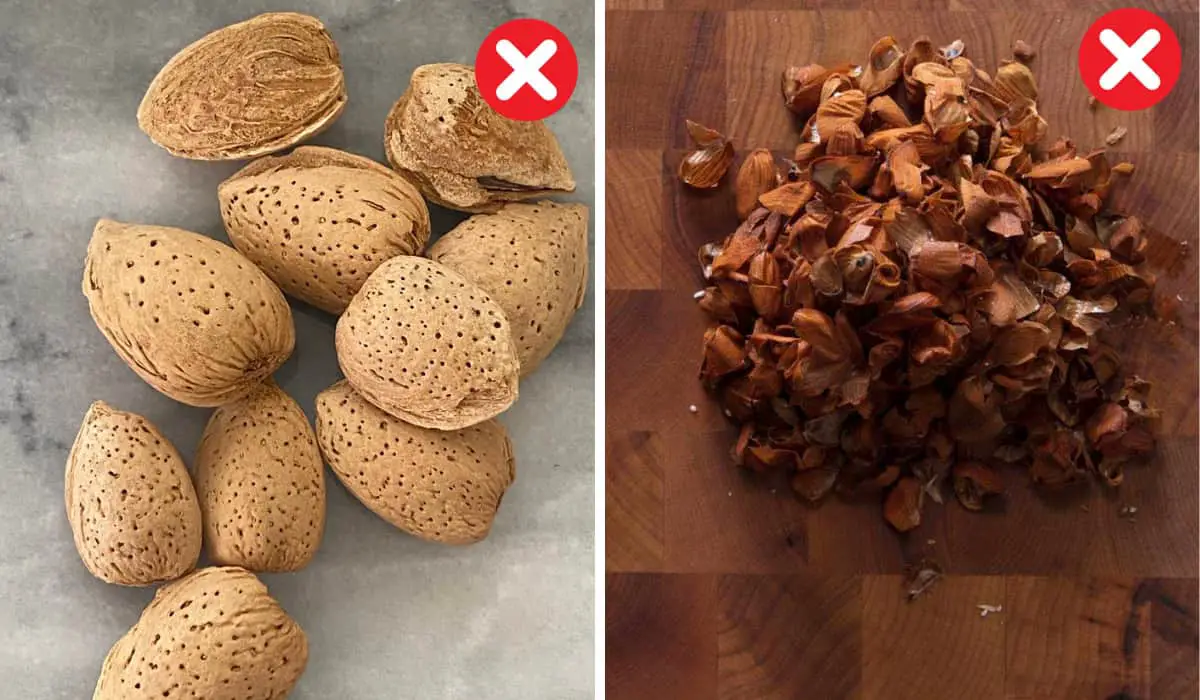A burning question many hamster enthusiasts have is: can hamsters eat almonds?
The short answer is: Yes, they can! But as with most treats, there’s a catch. Almonds should be given in moderation and with a few important precautions in mind.
Dive in with us as we unpack the ins and outs of hamsters and almonds.
- Hamsters can safely eat sweet and unsalted almonds in moderation; avoid bitter and salted varieties due to potential health risks.
- Small hamster breeds like dwarf and Chinese hamsters should have one almond per week, while larger breeds like Syrian and Roborovski hamsters can have two per week.
- Always remove the almond skin to avoid potential exposure to pesticides or harmful chemicals, and never give your hamster almond shells, due to the choking hazard.
- Alternate between different nuts/seeds to maintain a balanced diet for your hamster, always considering their individual dietary needs.
are almonds Safe for Hamsters?
Good news! Sweet almonds are safe for hamsters to eat. These delightful nuts come packed with essential nutrients, fiber, and antioxidants that can significantly benefit your hamster’s well-being.

However, it’s important to note that not every almond is hamster-friendly.
Sweet almonds? Absolutely Yes! Bitter and salted almonds? Definitely Not. The reason lies in the composition of these almond varieties.
Bitter almonds contain harmful substances like cyanide, and salted ones are high in sodium. These elements can lead to serious health issues in your hamster, such as poisoning, dehydration, and even diabetes.
How to tell if almonds are sweet or bitter before feeding them to hamsters
You might wonder how to distinguish between sweet and bitter almonds before offering them to your hamster. Here’s how:
- Size and Shape: Sweet almonds are typically larger with a rounder shape, while bitter almonds are smaller and slightly pointier.

- Color: Sweet almonds have light brown skin and a white interior, while bitter almonds have darker brown skin and a slightly yellowish interior.
- Senses: Trust your senses! Sweet almonds have a gentle nutty aroma and flavor, whereas bitter almonds have a strong bitter smell and taste.
To help you steer clear of bitter almonds, here are some handy tips:
- Check the labels: Look for words like “sweet”, “raw”, “natural”, or “California”.
- Be cautious: Steer clear of products that mention “bitter”, “extract”, “paste”, or “Chinese”.
How Much and How Often to Feed Almonds to Hamsters
Almonds, while not a staple in a hamster’s diet, can serve as an occasional treat that brings some variety to their meals. But how many almonds should you feed these furry little critters?
The guideline is simple: no more than two almonds per week for medium to large hamsters and one almond per week for the petite ones.
Breed-Specific Almond Guidelines
Hamsters, like humans, have unique dietary needs based on their breed. Here’s a quick guide:
- Syrian Hamsters: Treat your Syrian buddies to two peeled, unsalted, sweet almonds once a week.

- Roborovski Hamsters: These lively creatures also relish two peeled, unsalted, sweet almonds once a week.
- Dwarf Hamsters: Given their smaller size, Dwarf hamsters require just one peeled, unsalted, sweet almond once a week.
- Chinese Hamsters: Mirroring their Dwarf companions, Chinese hamsters should also be given one peeled, unsalted, sweet almond once a week.
How to prepare and Feed Almonds to Hamsters
Now that we’ve covered the quantity, let’s move on to preparation.
You might be thinking, “Why the emphasis on peeling the almond?” It’s because almond skin can harbor traces of pesticides or harmful chemicals, which we want to avoid introducing to our hamster’s system.

To prepare, simply immerse the almond in warm water for about 10 minutes to soften it, and then peel off the skin. It’s as straightforward as that!

Feeding can be done by either dropping the almond into the cage or offering it by hand as a special treat. If there are any leftovers or uneaten pieces, be sure to remove them from the cage to maintain cleanliness and avoid attracting pests.
It’s crucial to remember that every hamster is unique, so closely monitor your pet’s reaction to almonds.
If you notice any unusual behavior, consult with your vet immediately.
Health Benefits of Almonds for Hamsters
Packed with nutrients, almonds offer potential health benefits for your little furball.
- Almonds are rich in antioxidants, which can strengthen your hamster’s immune system, helping them ward off illnesses.
- The essential fatty acids in almonds can give your hamster a glossy and healthy coat.
- Almonds are a good source of calcium, contributing to robust teeth and bones.
- The proteins and healthy fats in almonds provide a steady supply of energy, aiding in maintaining a balanced metabolism in your hamster.
Risks of Almonds for Hamsters
almonds are not a risk-free snack for hamsters. It’s crucial to understand these potential hazards:
- Almonds naturally contain cyanogenic glycosides, which can release cyanide, a toxic substance, when consumed in excess.
- Almonds pack lots of calories and fats, which can lead to weight gain if fed in abundance, potentially triggering obesity and diabetes in your hamster.
- High levels of oxalates in almonds can contribute to kidney stone formation.
- Hamsters, like us, can also be allergic to nuts. If you notice your hamster exhibiting signs of an allergic reaction, such as difficulty breathing or excessive scratching, rush them to the vet immediately.
can hamsters eat dried almonds?
Absolutely! The dried almonds you choose should be unsalted and naturally sweet. Steer clear of any almonds that contain added sugars, oils, or preservatives.
These additives may seem harmless to us but could potentially harm your hamster’s health over time.
You might be wondering, “How many of these almond treats can I give my hamster?”
Just like fresh almonds, dried ones should only be given sparingly to your hamster – no more than two almonds per week.
Can Hamsters Eat Almond Shells and Skin?

When it comes to almond shells, the answer is a resounding No. Almond shells pose a choking hazard due to their hard and sharp nature.
Imagine trying to swallow a piece of bark – that’s what eating an almond shell would feel like to your hamster.
And how about the skins? They may seem harmless, but they can cause an allergic reaction.
Almond skins contain traces of cyanide, a toxic substance that can irritate your hamster’s skin and respiratory system.
It’s best to keep these potential hazards off your hamster’s snack menu.
What are Some Alternatives to Almonds for Hamsters?
When it comes to feeding your furry friend, variety is key. Here are a few safe and vet-approved nuts and seeds that can be part of a balanced hamster diet:
| Nut/Seed | Benefits for Hamsters | Safety Measures |
|---|---|---|
| Walnuts | High in omega-3, promotes a healthy coat | Ensure no added salt or flavorings |
| Cashews | Rich in proteins and essential minerals | Always choose unsalted |
| Pistachios | Provides healthy fats | Choose unsalted and without shelled |
| Sunflower Seeds | Packed with beneficial fats and protein | Control quantity to avoid excessive fat intake |
| Pumpkin Seeds | High in protein, contains beneficial fatty acids | Control quantity to ensure balanced diet |
| Peanuts | Source of proteins and fats | Check for mold and monitor for allergic reactions |
| Sesame Seeds | Can be fed occasionally | Moderation to avoid potential urinary issues |
Remember, every hamster is unique. What works for one might not work for another. So, it’s always best to experiment and see what your little buddy prefers.
F.A.Q
Can Hamsters Drink Almond Milk?
While almond milk might be a staple in your fridge, it’s not a fit for your hamster’s diet.
Hamsters are herbivores, meaning their digestive systems aren’t designed to process lactose or other milk derivatives. This includes plant-based alternatives like almond milk.
Can hamsters eat almond bread?
Despite its name, almond bread isn’t a safe bet for your hamster. While small amounts of almonds aren’t necessarily toxic to hamsters, almond bread typically contains additional ingredients.
Elements like salt, sugar, and artificial sweeteners can pose a risk to your furry friend’s health.
Can Baby Hamsters Eat Almonds?
The answer is a resounding no. For baby hamsters, hard and potentially indigestible foods like almonds can lead to severe health issues.
Instead, stick to specially formulated hamster milk and soft foods until they’re mature enough to handle a regular hamster diet.
Conclusion
yes, your hamster can enjoy an occasional almond treat. But remember to take into account their size, and the type of almond, and to always prioritize a balanced diet over treats.
Keep these tips in mind, and your hamster will be running on its wheel, squeaking in delight for years to come!
